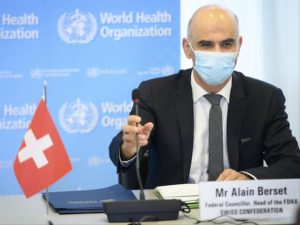Switzerland has reached an agreement with the World Health Organization (WHO) to host a global research/final repository for viruses with pandemic potential. The aim is to strengthen international defenses against emerging biological threats. The Memorandum of Understanding was signed at the WHO headquarters in Geneva, during the 74th Annual General Meeting of the member states of the UN health agency (see report).

It has been agreed that the facility will be housed in the biological safety laboratories of the Federal Department of Defense, Civil Protection and Sport (DDPS) in the town of Spiez and will be attached to that institution. Involved in the Novichok case and in chemical weapons treaties, it is already one of the world’s leading institutions in key areas of NBC protection. Switzerland is now making it available to the WHO as a repository for Sars-CoV-2 viruses or other pathogens with epidemic or pandemic potential. The institution’s website states in a recent message“Our infrastructure allows the safe handling of human pathogens of risk groups 3 and 4 at all times. We are able to carry out primary diagnostics for highly infectious and difficult-to-treat pathogens of these risk groups, including extensive differential diagnostics. We can cover diagnostic needs such as the development of new test methods for both known and as yet unknown pathogens. Furthermore, we have the ability to analyze unknown suspected samples (e.g. sequencing) – if necessary with the involvement of expertise from other disciplines, which is uniquely possible at Spiez Laboratory.”
 According to WHO Director-General Tedros Adhanom Ghebreyesus, this so-called BioHub laboratory “will store and analyze pathogens from around the world and improve the rapid exchange of information between laboratories around the world. This will be a reliable, secure and transparent mechanism for member states to voluntarily share pathogens and clinical samples. The Covid-19 pandemic and other outbreaks and epidemics have underscored the importance of rapid pathogen sharing to help the global scientific community assess risk and develop countermeasures such as diagnostics, therapeutics and vaccines.” “Close international cooperation to ensure the timely exchange of epidemiological and clinical data and biological materials is of utmost importance,” said Swiss Health Minister Alain Berset. “We hope to contribute to the establishment of an international exchange system for SARS-CoV-2 and other emerging pathogens. Currently, most pathogens are shared ad hoc between countries, which can be slow and leaves some countries out of the loop.”
According to WHO Director-General Tedros Adhanom Ghebreyesus, this so-called BioHub laboratory “will store and analyze pathogens from around the world and improve the rapid exchange of information between laboratories around the world. This will be a reliable, secure and transparent mechanism for member states to voluntarily share pathogens and clinical samples. The Covid-19 pandemic and other outbreaks and epidemics have underscored the importance of rapid pathogen sharing to help the global scientific community assess risk and develop countermeasures such as diagnostics, therapeutics and vaccines.” “Close international cooperation to ensure the timely exchange of epidemiological and clinical data and biological materials is of utmost importance,” said Swiss Health Minister Alain Berset. “We hope to contribute to the establishment of an international exchange system for SARS-CoV-2 and other emerging pathogens. Currently, most pathogens are shared ad hoc between countries, which can be slow and leaves some countries out of the loop.”

Together with the call for a new era of international cooperation, the WHO already emphasized a year ago that a return to the status quo is not an option in view of the current pandemic. A new, global system for the exchange of pathogen materials should not be based on bilateral agreements and should not take years to negotiate. According to the WHO statement, the BioHub will now allow the 194 member states to share biological material with the facility under pre-agreed conditions to facilitate and ensure the flow of information in terms of timeliness and predictability in responding to potential outbreaks. Following the results of the pilot project, the BioHub will be expanded from SARS-CoV-2 and its variants to other pathogens in 2022 and will be linked to other laboratory networks and repositories around the world.










